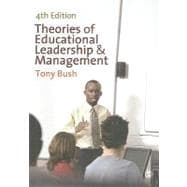In this established text Tony Bush presents the major theories of educational management, and links them to contemporary policy and practice.
Leadership continues to be one of the major criteria used to differentiate the models but the author now makes clear links between educational management theories and the main models of leadership. The author applies the models to a range of international contexts, including both developed and developing countries. This relates to global interest in concepts of leadership and management and to an increasing recognition of the need to customize theory and practice to each context and culture rather than adopting a 'one size fits all' approach.
For the fourth edition, the essential conceptual models remain. New case study material has been added from the full range of education and non-school settings, from early years through to further and higher education. Each chapter now includes key words, summary and end of chapter materials including issues for discussion. Key terms are defined in-text for the non-expert reader and all references and relevant key legislation details have been fully updated.
This book is essential reading for all teachers who aspire to management, as well as for experienced leaders on Masters' level courses, and for those studying school management as part of education studies degrees.
This internationally popular and classic text has been thoroughly revised and updated for the 4th edition with the latest research findings, new case studies and examples from around the world, and an increased focus on early years, post compulsory education and extended schools.








